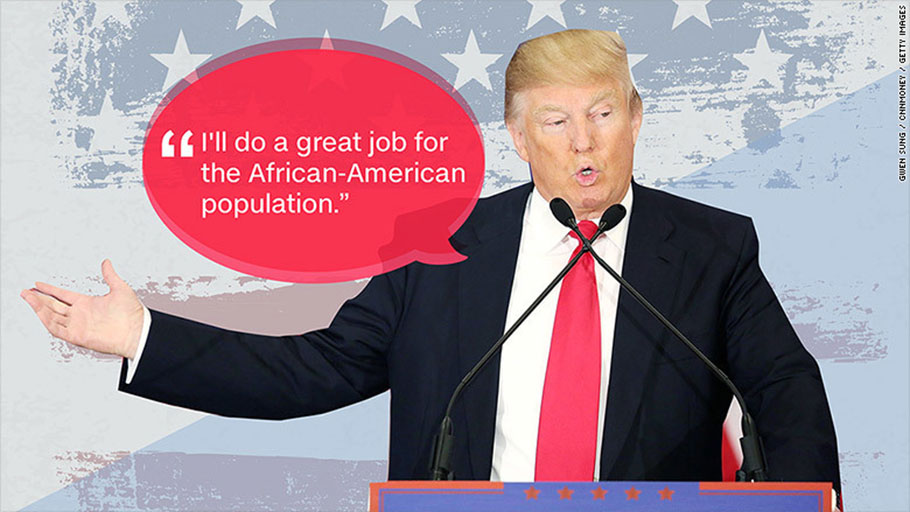By Earl Ofari Hutchinson —
Trump predictably wasted no time in crowing that he was the reason for the big plunge in the black jobless rate. It was part his trademark ego, and part a chance to score political points by digging at the Democrats talking. He bellowed his stock campaign spiel, “what do blacks have to lose by voting for me. “ That aside, it is a mix of the continuing spiral upward of the economy that began early in Obama’s second term, and the entrenched Bureau of Labor Statistics manipulation of who and how it counts as the jobless that account for the jobs surge. The figures more than bear out that Obama must get the political credit for the job upswing. The actual biggest percentage drop in black unemployment didn’t come with the release of the latest BLS numbers, but in the two months from December 2011 to January 2012. That was the tail end of Obama’s first term. The employment cycle continued steadily upward after that.
There is no mystery why the cycle up has continued. There is more state and federal spending on infrastructure projects, the expansion of retail, tech and service industries, more robust state budgets due to increased tax revenues, and increased investment of foreign companies in the country. The bulk of the jobs, though, are minimum or slightly above minimum wage jobs, with minimum or non-existent labor protections, health benefits, and management promotion opportunities. Still, a paycheck is a paycheck, and if more blacks are getting those checks no matter the type of jobs, and pay, it still counts big in the labor picture. The credit for that goes to Obama, not Trump.
There is the dark side that also explains the seeming run-up in black employment. Fewer and fewer blacks are even counted as in the labor force. They are invisible either through prolonged unemployment, not actively looking for work, were part timers, or simply didn’t fit into any of the varied measures the BLS uses to determine who is a valid worker, and should be counted.
The other way the books are cooked on the employment figures is to downplay the crisis of joblessness among young black males. They are the group that is hammered harder with chronic high unemployment than any other segment of the working population. The news of record high black employment made no mention of whether their numbers also took the same sharp downward turn as the overall black jobless numbers.
The Great Depression-level jobless numbers among young black males was a major issue, and sore point, during the Obama years with many blacks. At various times the Congressional Black Caucus publicly prodded Obama to say and do more about the jobless crisis. Obama made it plain then and on the handful of occasions that the issue has publicly surfaced since then that his antidote to high unemployment was to pound the GOP to back his tax hikes on the rich, job creation stimulus measures, and his demand that corporations bring back the tens of billions they’ve parked offshore and plow them into domestic job expansion that generates jobs for all. There was merit to Obama’s position. A recovering, robust economy does mean more jobs. But the troubling question as always is who gets the jobs even when the economy officially is humming?
The Clinton years provide one answer to that question. During the late 1990s joblessness tumbled to its lowest levels in two decades. Help wanted signs were everywhere. Deficit spending was not a major administration or congressional flashpoint issue since the government had a healthy budget surplus. There was no wholesale flight of capital to off shore havens, ballooning trade deficits, and corporations and medium sized businesses expanded. Yet, during the economic boom times, the unemployment rate for young black males was double — and in some parts of the country — triple that of white males. Plentiful jobs did not wipe out the nagging racial gap in employment.
That’s the case now. Studies and surveys still show that young black males, with no arrest records, are far less likely to get a job than young white males with arrest records. The big problem with touting the real and inflated black unemployment drop is that Trump, the GOP can gleefully wave this around as yet another excuse to claim the black unemployment crisis is over. And, of course, that their giveaway tax policies to the wealthy and corporations, gutting business regulations, and the slash and burn of spending on job and education programs is the permanent antidote to black joblessness.
This will be Trump and the GOP’s mantra in the crucial 2018 mid-term elections they’ll bludgeon the Democrats with. The counter must be, yes, more blacks may be working, but what type of jobs, and jobs for whom? Worse, when the GOP’s wealth gap widening policies dump more blacks in the poverty ranks, even with a job, will Trump still be able to crow look how much better you are under me?
Earl Ofari Hutchinson is an author and political analyst. He is the author of the forthcoming 50 Years Later: Why the Murder of Dr. King Still Hurts (Middle Passage Press). He is a weekly co-host of the Al Sharpton Show on Radio One. He is the host of the weekly Hutchinson Report on KPFK 90.7 FM Los Angeles and the Pacifica Network.















